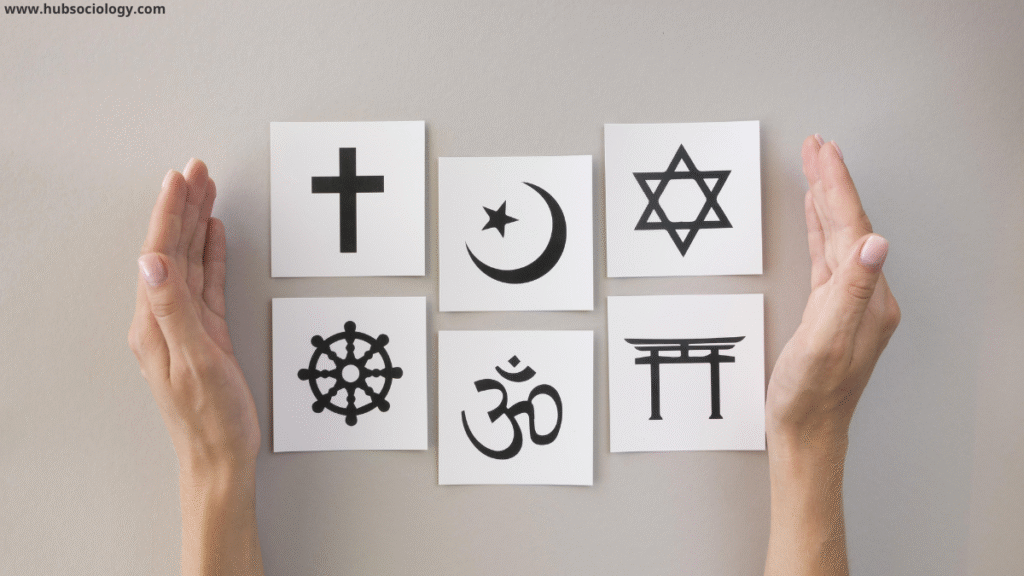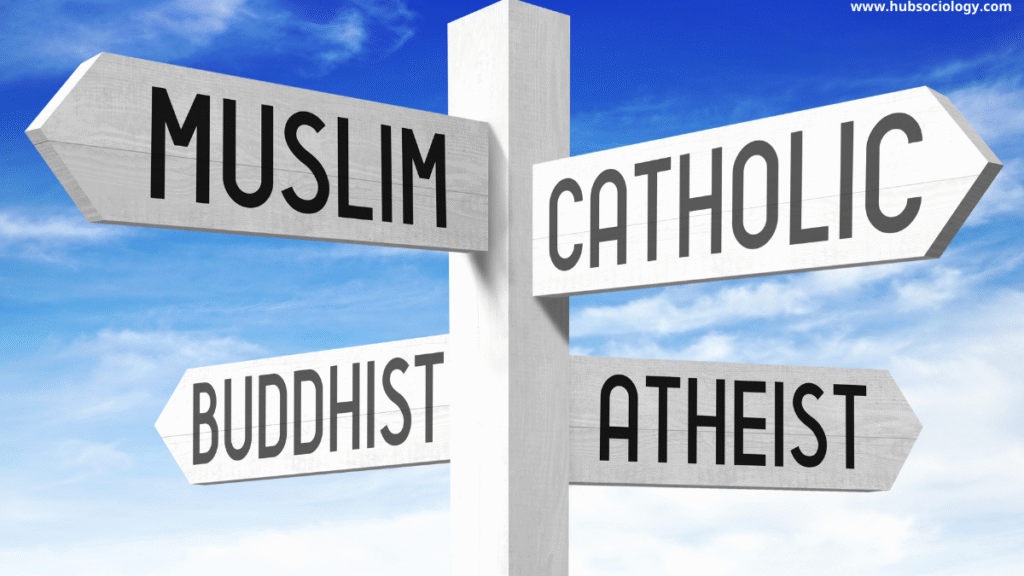Introduction
The relationship between religion and society has undergone a profound transformation in Europe over the past five centuries. From the dominance of the medieval Church to the Enlightenment’s rationalism, the Reformation’s fragmentation, and the modern pluralist democratic state, Europe has been a primary site for studying secularization and secularism.
These two concepts, while related, are not identical. Secularization refers to the sociological process through which religion loses its influence over various spheres of social life, while secularism is a normative or political doctrine advocating the separation of religion from political and state affairs. Examining the European experience provides a critical lens to understand how historical, cultural, and institutional changes shaped the decline of religious authority and the rise of secular values.

The Concept of Secularization
Secularization in sociology primarily addresses the transformation of society where religion no longer commands the same public authority it once did. Max Weber described this in terms of the “disenchantment of the world”—the replacement of religious and magical explanations with rational-scientific ones. Émile Durkheim, while acknowledging religion as a source of social cohesion, saw modernization and industrialization as shifting moral authority from the sacred to collective social institutions like education, law, and the state. Peter Berger initially supported the “secularization thesis” that modernization inevitably reduces religious influence, though he later revised his stance, noting the persistence of religious pluralism.
Secularism: The Political and Ideological Dimension
Secularism, in contrast, refers to a deliberate political arrangement. It emphasizes the neutrality of the state in matters of faith, guaranteeing freedom of religion and belief. Secularism does not necessarily mean hostility toward religion but rather aims to prevent religious dominance over political and social institutions. In Europe, secularism was institutionalized in varying degrees: the French model of laïcité represents a strict separation of religion and state, while in countries like the United Kingdom, religion retains symbolic ties with the state (e.g., the Church of England) but has limited political influence. This duality reflects the multiple pathways through which European societies negotiated secular ideals.
Historical Roots of Secularization in Europe
The European secularization process is deeply intertwined with major historical transformations:
- The Protestant Reformation (16th century):
The Reformation weakened the monopoly of the Catholic Church and introduced religious pluralism. While intended to reaffirm faith, it inadvertently fragmented Christian authority and paved the way for questioning religious dominance in politics. - The Enlightenment (17th–18th centuries):
Thinkers like Voltaire, Rousseau, and Kant emphasized reason, individual rights, and skepticism toward clerical authority. The Enlightenment cultivated secular humanism and encouraged the view that morality could exist independently of religion. - The French Revolution (1789):
Marking a turning point, the revolution curtailed the Church’s political privileges, nationalized its property, and instituted secular civic values. The principle of laïcité became a cornerstone of French society. - Industrialization and Urbanization (19th century):
Modernization shifted people from rural, church-centered communities to urban, industrial contexts where education, science, and rational organization played greater roles than religious authority. - 20th Century Conflicts and Modern States:
World wars, totalitarian regimes, and the creation of welfare states emphasized the role of secular governance. Religion became a private matter, while social solidarity was organized through state institutions rather than the Church.
Varieties of Secularism in Europe
Europe is not uniform in its approach to secularism. Instead, we find multiple models shaped by national histories:
- France (Laïcité):
Religion is excluded from public institutions, especially education. The state enforces strict neutrality, banning religious symbols in public schools to preserve equality and civic identity. - United Kingdom (Established Religion with Secular Governance):
Despite the Church of England’s status, governance functions through secular democratic institutions. Religious pluralism is tolerated, and faith communities play roles in charity and education but not in political decision-making. - Germany (Cooperative Secularism):
Religion is not entirely separated but functions in cooperation with the state. Religious instruction may be part of public education, and churches collect taxes, yet the state upholds religious freedom and neutrality. - Scandinavia (Post-Christian Secularism):
Nordic countries historically had state churches but today display some of the lowest levels of religious practice worldwide. Here, secularization manifests more as cultural secularism—religion is marginalized socially even if some formal ties remain.

Sociological Dimensions of Secularization
From a sociological perspective, secularization in Europe can be understood through several dimensions:
- Institutional Differentiation:
As modern societies evolved, religion lost its monopoly over education, law, health, and politics. These domains became autonomous, governed by secular rationality. - Decline of Religious Belief and Practice:
Church attendance, religious rituals, and belief in traditional doctrines have declined significantly in many European countries. Surveys show high levels of atheism or “non-affiliation,” particularly in Western and Northern Europe. - Privatization of Religion:
Religion increasingly becomes a personal choice, relegated to the private sphere rather than a collective social force. This reflects Thomas Luckmann’s idea of the “invisible religion,” where spiritual belief persists but outside organized institutions. - Pluralism and Tolerance:
European secularization fostered pluralism, allowing diverse religions, philosophies, and worldviews to coexist. Instead of a singular religious order, societies now manage cultural and religious diversity through secular frameworks.
Challenges and Critiques of Secularization in Europe
Despite its historical depth, secularization in Europe is neither linear nor uncontested:
- Persistence of Religion:
Even in highly secular societies, religion persists in cultural traditions, festivals, moral debates, and identity politics. For example, Christian heritage remains visible in holidays, architecture, and national rituals. - Immigration and Religious Diversity:
Immigration from Muslim-majority countries and other regions has challenged Europe’s secular identity. Debates over headscarves, halal food, or mosque construction reflect tensions between secular values and multiculturalism. - Post-Secular Society:
Thinkers like Jürgen Habermas argue that Europe may be moving toward a “post-secular” stage, where secular and religious voices coexist in the public sphere, requiring dialogue rather than exclusion. - Rise of Religious Nationalism:
In some contexts, religion reappears as a marker of national identity against globalization or cultural pluralism. This complicates the neat separation between religion and politics.
The European Model and Global Influence
Europe’s secularization has profoundly influenced global political thought. The Enlightenment ideals of secular governance inspired constitutional designs worldwide, from the U.S. First Amendment to India’s principle of secularism. Yet, the European experience remains unique due to its specific historical conflicts with the Church, colonial encounters, and integration of modern welfare states. Other societies often adapt secularism differently, reflecting their cultural and religious contexts.
Conclusion
The European experience of secularization and secularism demonstrates a complex sociological process. Secularization as a social phenomenon reflects the decline of religion’s dominance over institutions, beliefs, and practices, while secularism as an ideology secures pluralism and neutrality in governance. Europe illustrates not only the shift from religious monopoly to secular modernity but also the challenges of managing diversity, cultural heritage, and religious resurgence in a globalized world.

From Weber’s disenchantment thesis to contemporary debates about post-secular societies, Europe continues to serve as a laboratory for studying the evolving balance between faith, reason, and modernity. Ultimately, the European journey underscores that secularization is not the disappearance of religion but its transformation in meaning, scope, and relevance within society.
Topic-related questions
5 Marks Questions
- Define secularization in the sociological sense.
- What is meant by laïcité in the French context?
- Mention two major historical events that influenced secularization in Europe.
- Differentiate between secularization and secularism.
- What does Weber mean by the “disenchantment of the world”?
10 Marks Questions
- Discuss the role of the Enlightenment in shaping secularism in Europe.
- Explain how the Protestant Reformation contributed to the secularization of European society.
- Compare the French and British models of secularism.
- Analyze the impact of industrialization and urbanization on the decline of religious authority in Europe.
- How does privatization of religion reflect the process of secularization in modern European societies?
15 Marks Questions
- Critically examine the sociological dimensions of secularization in Europe with reference to institutional differentiation and privatization of religion.
- “Europe represents the classical site of secularization, but religion continues to persist in cultural and political forms.” Discuss.
- Evaluate the challenges to secularism in contemporary Europe in light of immigration, multiculturalism, and religious nationalism.
- Discuss the varieties of secularism in Europe (France, UK, Germany, Scandinavia) and their sociological implications.
- Explain the theoretical perspectives of Weber, Durkheim, and Berger on secularization, and assess their relevance to the European experience
Do you like this this Article ? You Can follow as on :-
Facebook – https://www.facebook.com/hubsociology
Whatsapp Channel – https://whatsapp.com/channel/0029Vb6D8vGKWEKpJpu5QP0O
Gmail – hubsociology@gmail.com

1 thought on “Secularization and Secularism in European Experience: A Sociological Perspective”